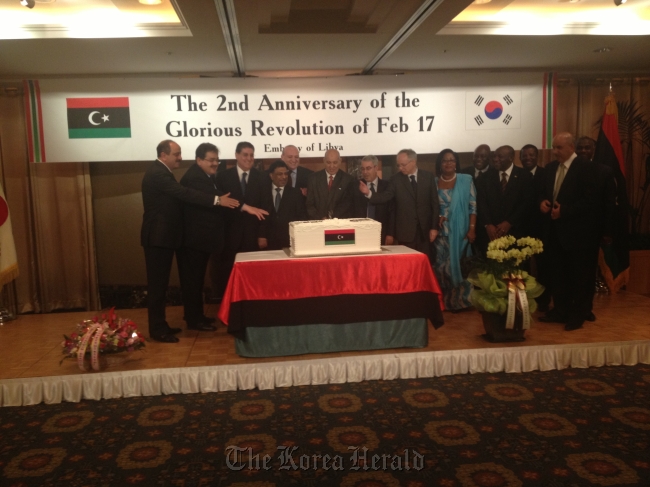Libya’s diplomatic mission here held a reception in Seoul on Monday to mark two years since Libyan youth took up arms and defied a deadly crackdown by strongman Moammar Gadhafi.
The demonstrations were part of a wave of popular discontent dubbed the “Arab Spring,” which toppled long-standing despotic regimes in Tunisia and Egypt, before spreading to Libya on Feb. 17, 2011. Gadhafi was shot dead in October of the same year.
It is estimated that some 30,000 Libyans died in eight months of fighting. Libyans mark the overthrow of Gadhafi on Feb. 17, Revolution Day.
In July 2012 Libya conducted its first fair and free elections ever, voting in the 200-seat General National Congress. The country elected 30 women in that poll.
 |
Libyan Charge d’Affaires Otman S.M. Daouki (center) is joined by envoys from the Middle East and Africa in a cake-cutting ceremony during a reception on Monday celebrating the second anniversary of the Libyan revolution that toppled strongman Moammar Gadhafi. (Philip Iglauer/The Korea Herald) |
“Our people have managed in 2012 through a fair, civilized and democratic process that was hailed by the world the election of our first democratic parliament, the General National Congress, electing an interim government,” said Otman S.M. Daouki, Libya’s charge d’affaires to Korea.
The new unicameral parliament formed a government and set up a panel to draft a new constitution, accomplishments hailed by the U.S. and Europe and others.
But the country also faces setbacks. Two years on, the new government is now struggling to control its borders, stop the smuggling of weapons and manage regional militias that have refused to disarm.
“I assure you that the government and people of Libya are keen to enhance cooperation and friendship with the Republic of Korea in all fields,” Daouki said.
The trouble Libya faces was perhaps best exemplified in the terrorist attack on a U.S. diplomatic mission in Benghazi in the east of the country, where American Ambassador Christopher Stevens and three others were killed in September and amid evidence that the several dozen militants who attacked an Algerian natural gas plant in January in fact came from Libya.
“As Turkish, Chinese, European, U.S. and Russian companies are returning to Libya to resume their business, I am pleased to convey the willingness of the Libyan government to invite Korean companies to return to Libya, as well, to resume work on stalled projects and to start negotiating new development projects,” Daouki said during the reception.
Scores of dignitaries, foreign envoys and the Arab expatriate community came out in a show of support here for the new Libyan government.
Of the many receptions organized for the foreign diplomatic community, the reception held Monday might have been the most supportive. Nearly every ambassador or head of mission from Africa and the Middle East were in attendance Monday.
“The ‘New Libya’ is strengthening friendships and cooperation based on common interests and mutual respect with all countries in the world,” Daouki said.
By Philip Iglauer (
ephilip2011@heraldcorp.com)








